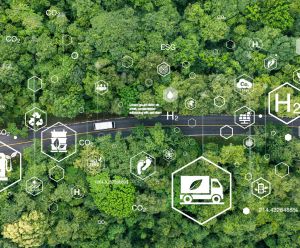
Playing the long game: Decathlon Thailand gives sustainability a sporting chance

Around the world, tackling the threat of climate change and embracing sustainability is becoming a top business priority. A recent survey of global business leaders found that in 2024, 52 percent of organizations expect to increase their investments in sustainability, while 61 percent view a lack of sustainable practices as an existential threat.
Decathlon is no exception. As the global sports brand and sports retailing business, Decathlon has set science-based targets that are consistent with limiting global temperature rise to 1.5 degrees Celsius. These include a global commitment to becoming carbon neutral by 2050 and reducing its absolute emissions by 20 percent by 2026 compared to 2021.
Decathlon Thailand has also launched a raft of ambitious initiatives to help it meet these targets, such as committing to zero waste to disposal by 2026 and eco-designing 100 percent of its products by the same year.
“Climate change threatens the world we live in, and without change – on every level – our planet is in peril. That is why we aim to be a driving force and a beacon of light for a sustainable future” said Sira Juntrasook, Sustainability Leader at Decathlon Thailand.
Apart from its global corporate sustainability commitments, Decathlon Thailand has also faced strict regulations on sustainable energy in its home market of Thailand. Thailand’s energy efficiency laws dictate that factories must submit sustainability reports to regulatory bodies every year.
But by drawing on strong internal governance models, based on constant feedback loops across the organization’s ecosystem, the Decathlon Thailand team has charted a bold sustainability strategy adapted to the Thailand market, while staying true to the Decathlon brand’s global mission.
“Like every country team under the Decathlon umbrella, we are accountable for defining a suitable sustainable strategy for our market. With that freedom comes a huge responsibility to get it right,” said Juntrasook.
Investing in sustainable manufacturing processes
Decathlon Thailand took its first steps toward implementing a sustainability strategy when it began to invest in sustainable product design and manufacturing processes.
“Along with using more recycled materials in our products, we started exploring new ways to reduce energy consumption in our main factories across the country, which covers 90 percent of our production capacity. That included installing new equipment that uses less water and energy to create and finish our products,” Juntrasook explained.
The organization has also begun working with suppliers to improve their sustainability performance.
“We want our suppliers to commit to the same science-based targets that we have, to limit our planet’s temperature increase to 1.5 degrees Celsius above pre-industrial levels,” said Juntrasook. “So, we request that our partners collaborate with us on implementing emissions reduction projects. We have also developed a system where suppliers disclose their monthly emissions to us. If the data indicates that targets are not being met, we will jump in with tools and support for how to address that."
Spreading the message downstream
Decathlon Thailand decided to deepen its sustainability approach to include downstream processes such as retailing. That meant finding ways to help its retail outlets reduce the environmental impact of their operations.
“We seek to deploy renewable electricity to help power the business. That includes switching to renewable sources and optimizing cooling systems to reduce energy consumption,” said Juntrasook.
With its four standalone stores, the organization is taking further measures, such as installing solar panels on the roofs to power up store operations. Decathlon Thailand is also trying to approach the building owners of their physical stores to arrange for renewable electricity plans for their stores stationed in malls.
Other ways the organization is working to reduce its environmental impact include recycling plastics, cardboard, and metal waste, and reducing single-use cardboard packaging and plastics across the organization’s logistics and retail operations. A portion of its trash is sent to a waste-to-energy plant in Thailand, where it is converted into electricity. At the same time, product lifecycles are extended through repair, or upcycling.
“We strongly encourage our teams not to throw away what can be reused. We currently redistribute our plastic clothes hangers to be reused in our factories and stores. And leftover and broken hangers are sent to plastics recycling facilities,” Juntrasook reports.
As the Decathlon Thailand team seeks to accelerate towards its sustainability goals, it has found it pays to be courageous enough to start a sustainable trend.
“Our aim is that by 2026, we’ll be recycling every bit of waste – we’re at 85 percent so far,” said Juntrasook.
Tackling Scope 3 emissions with sustainable logistics
While most companies are dedicated to tackling emissions on scopes 1 and 2, scope 3 emissions, also known as indirect carbon emissions, are a lot harder to tackle. Scope 3 emissions are a consequence of the company’s activities outside their direct control, extending to the stakeholders they work with, and the facilities they do not own. This makes Scope 3 emissions tougher to track, report, and hence reduce.
However, according to research by PwC, scope 3 emissions typically contribute 65 to 95 percent of most companies’ carbon impact. Hoping to address the bulk of its carbon emissions, Decathlon Thailand’s sustainability approach emphasizes a combination of carbon insetting – changing how it does business within its value chain – and offsetting emissions using carbon credits.
Sustainable logistics emphasizes using alternative fuels, electric vehicles, and optimized transportation routes to reduce greenhouse gas emissions. It also promotes energy efficiency across the logistics network, such as implementing warehouse energy management systems. Together, these steps help businesses reduce their overall carbon footprint.
Decathlon Thailand transports most of its stock in bulk by ocean freight, which typically takes two to three months, but sample shipments require speedier delivery processes via air transport. As such, Decathlon Thailand’s production team faced the challenge of getting Decathlon Thailand’s sample sportswear pieces to European development teams as fast as possible and sustainably.
To improve carbon efficiency on their sample deliveries, Decathlon Thailand engaged DHL Express Thailand, and signed on to its GoGreen Plus service, allowing them to use Sustainable Aviation Fuel (SAF), which is produced from waste oil, for their sample shipments.
More importantly, GoGreen Plus is aligned with Decathlon’s Science Based Target Initiative (SBTi) philosophy and customers can use it to measure and quantify their voluntary emission reporting.
“Signing on for the GoGreen Plus program has helped us reduce our scope 3 emissions, which are the indirect GHG emissions within our supply chain. In the first year alone, signing up for the GoGreen Plus program has helped us reduce up to 30 percent of carbon emissions on our sample deliveries compared to our previous results,” Juntrasook reports.
Looking ahead, Decathlon Thailand is initiating new steps to hone its sustainability approach. This includes exploring ways to electrify its last-mile network and using sustainable delivery modes such as bicycles and e-bikes.
As Juntrasook puts it, driving change is an ongoing process.
“While there’s plenty of room for progress, I’m super proud of what we’ve achieved,” he said. I’m also excited about what more we can do as we continue down this road fueled by our passion to transition to responsible operations and help create a more sustainable future for all.”
ALSO WORTH READING




















 English
English